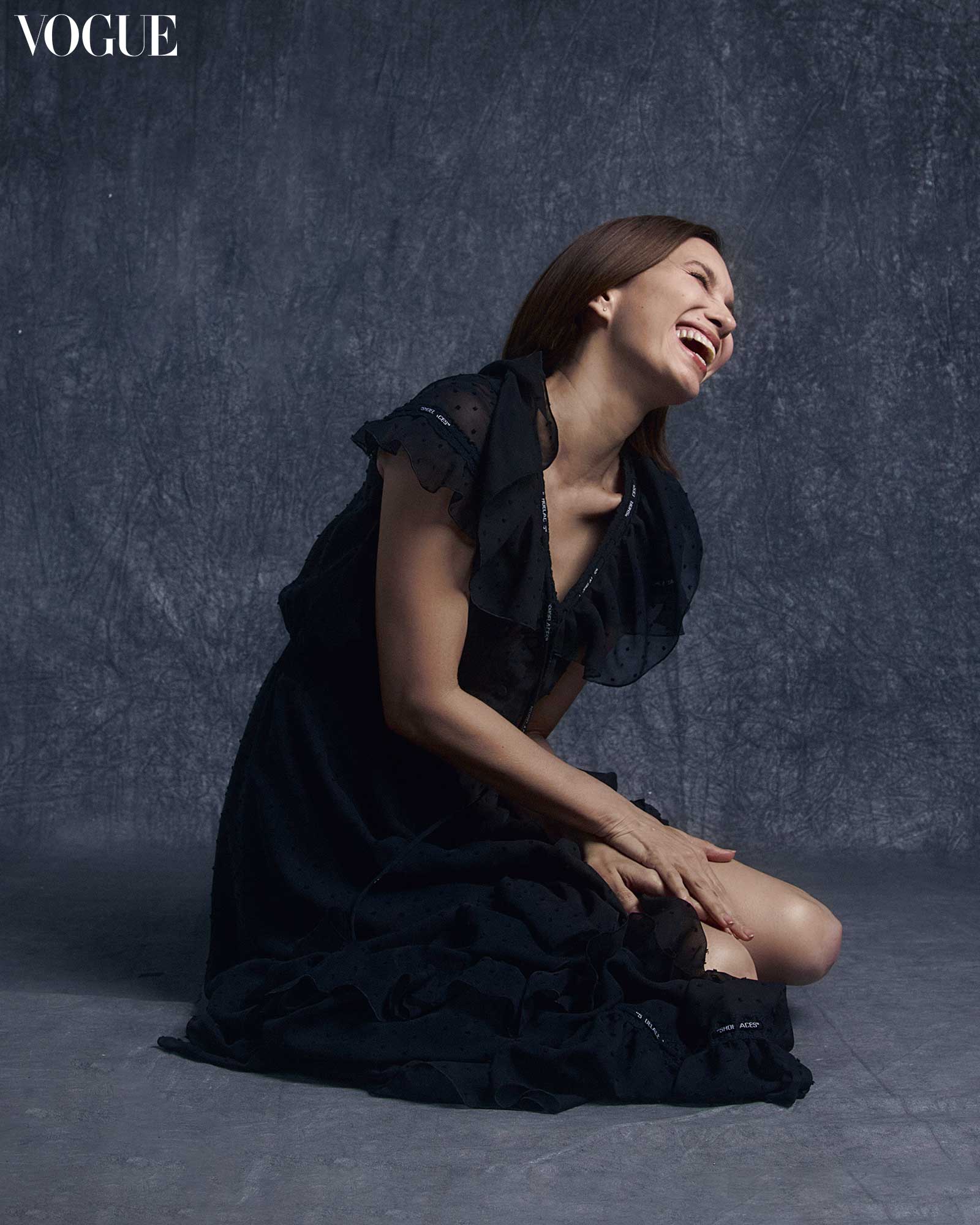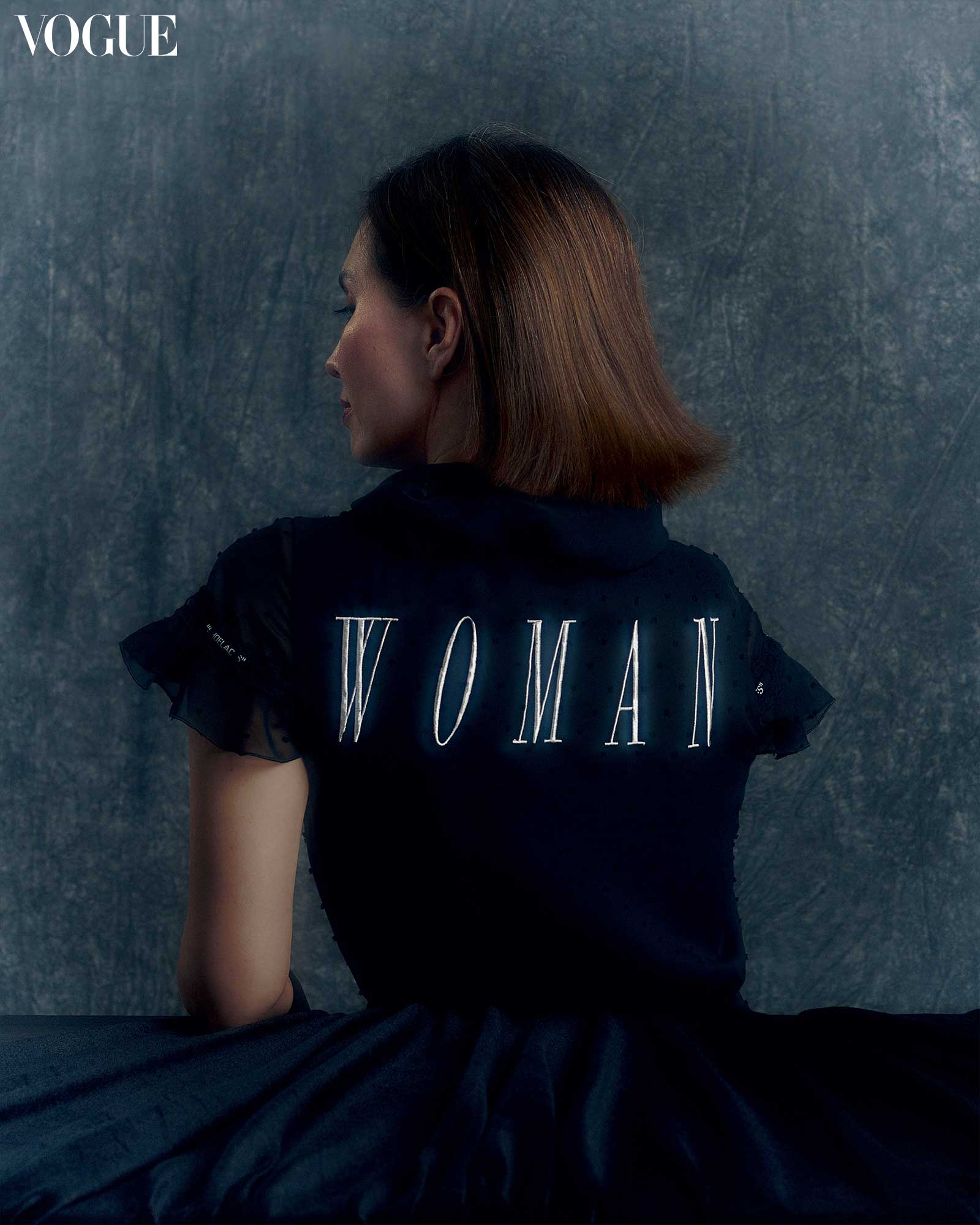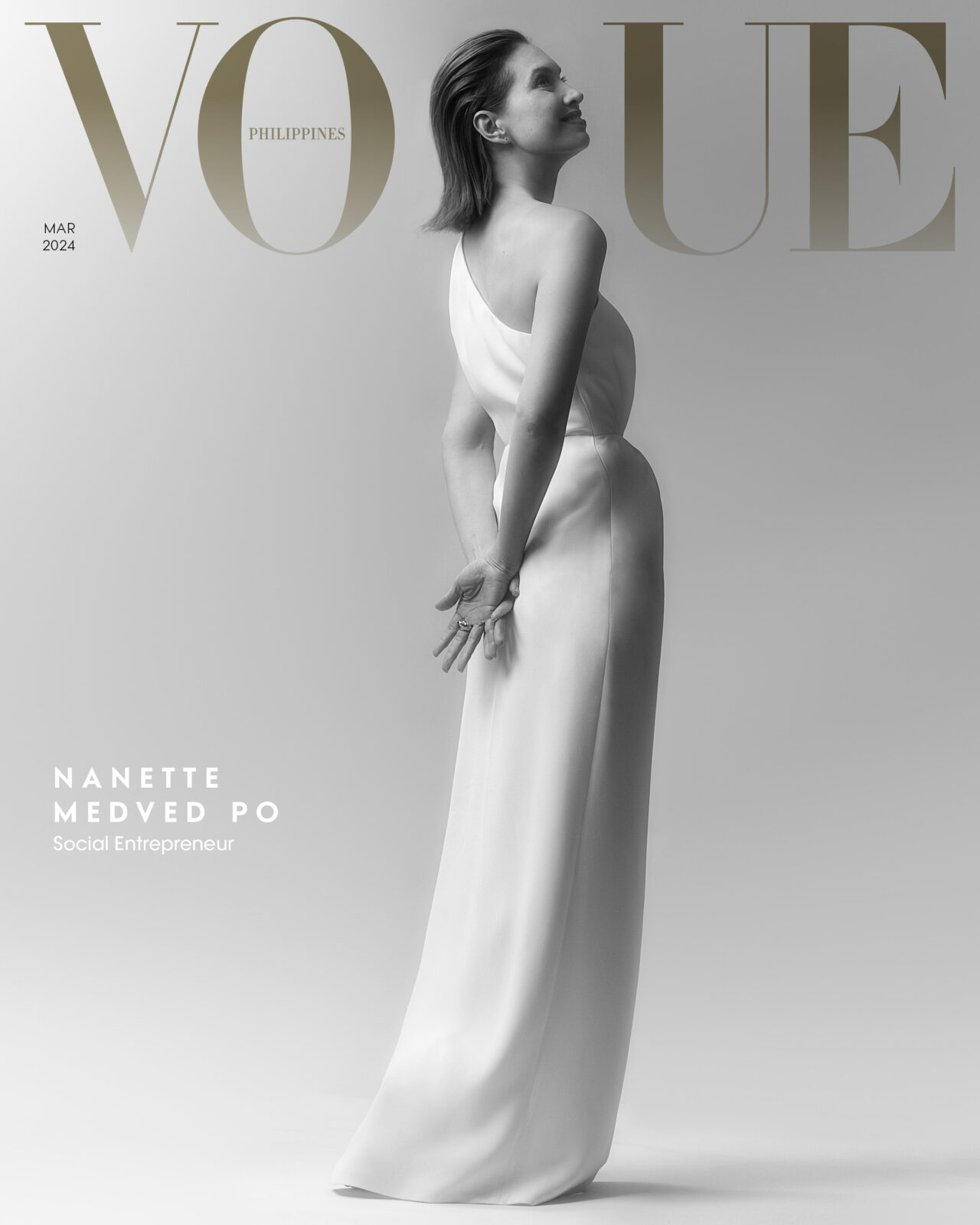Dior dress, WHISENHUNT ring. Photographed by Colin Dancel for the March 2024 Issue of Vogue Philippines
The quiet pioneer tackles education, agriculture, and plastic pollution with a world of hope.
Nanette Medved-Po appears in Vogue Philippines’ March 2024 issue, themed “Raising Hope” in the spirit of International Women’s Month. Visit vogue.ph everyday this month for daily features on inspiring women, as nominated by the people whose lives they’ve changed.
“That was a brash move. What was I thinking?” Nanette Medved-Po laughs as she reflects on the beginnings of Hope, her impact organization. “I wanted to make a point that the single bottom-line that only benefited shareholders was not doing good for the world, and I was frustrated because I contacted some companies to see if they would adopt the multiple bottom-line approach and nobody wanted to do it. I was so angry so I said, ‘I would do it myself!’”
Since 2012, Hope has successfully constructed 128 classrooms across the nation, utilizing proceeds generated from the sales of their bottled purified water, branded as Hope in a Bottle. “Now the millionaire and his driver can equally contribute to nation-building when they purchase a simple bottle of water,” says the summa cum laude graduate from Babson College in Massachusetts. Furthermore, choosing to spend on an item that improves public school infrastructure is a statement. “That moral signaling will maybe inspire somebody to also do something good. We really wanted it to be not just a bottle of water, the primary product is the concept of hope.”

From education, Hope expanded to agriculture and livelihood generation. In an effort to enhance the productivity and increase the earnings of small holder farmers, the organization has been providing farming inputs, training, and market access. Through this initiative, more than 1.4 million trees have been planted and over 25,000 farmers have been reached, to date. Hope is also one of the Philippines’ first certified B Corporations, which means they have met stringent international standards for businesses who balance profit and purpose.
And then there’s Hope’s environmental conservation campaign which has diverted roughly four million kilograms of plastic waste from nature. In 2019, they launched “Aling Tindera,” which involves female owners of sari-sari stores [neighborhood sundry stores]. The waste-to-cash program replicates the trading behavior for discarded glass and scrap paper. Community members are urged to gather their plastic waste and sell them to their local “Aling Tindera.” Nanette’s group then purchases the collected stash, allowing the store owner to earn a margin. Among the 100-plus participants, the average annual income has seen a significant rise of 48 percent. “Women micro-entrepreneurs can be a silver bullet to a country’s development. They’re amazing, not only can you rely on them to be highly resourceful but they really care about these issues that affect not only them but their families and their communities so they’re great sustainability champions and highly responsible. We love working with them, they’re very passionate. They get their kids and husbands involved. Each one of them is an inspiration.”

Lately, Nanette has been giving considerable attention to curbing the use of plastic. “The Philippines is said to be the third worst offender in the world for ocean plastic pollution. This makes this a national security issue as it threatens food supply, livelihoods, and human health,” she laments. Out of this awareness emerged Plastic Credit Exchange (PCX) which in a nutshell, fights against two things—the use of unessential plastics and plastic pollution. “That was completely by accident. I was trying to figure out how to make Hope responsible for its own plastic footprint and wound up building an entire ecosystem to deliver the solution.”
Along the way, she managed to make history. PCX Solutions, the non-profit entity, is the first in the world to establish a fully transparent, third-party audited Plastic Pollution Reduction Standard to ensure the impact and responsibility of plastic waste projects. On the other hand, PCX Markets, the commercial arm, is the world’s only fully transparent global marketplace for audited plastic waste reduction that provides seamless and traceable solutions to take responsibility for post-consumer plastics.
“Now more than ever, there’s a duty to hope, we owe it to each other”
Nanette takes great pride in the Philippines for passing the most aggressive Extended Producer Responsibility (EPR) legislation in the world for plastic. She was part of the technical working group that drafted the EPR Law, which holds companies responsible for the plastic packaging they use throughout the lifecycle of their products, until its end of life. “Our work provided the data that was given to lawmakers. PCX is also a compliance enabler so we work with over a hundred companies in the Philippines to help them comply with the law.”
Leveraging her experience and perspective, she shares the Philippines’ case study on EPR with other countries. “We’re trying to inspire the world and we’re so excited to do it because when do you have that kind of a global feel-good story from the Philippines, right?” She participated in the United Nations negotiations for the global treaty on plastic pollution, she was present during the Intergovernmental Negotiating Committee (INC) sessions in Paris and Nairobi. She’s also had several opportunities to engage with audiences from other sectors through presentations to the World Trade Organization with the Department of Environment and Natural Resources as well as during trips to events such as the Climate Week and World Economic Forum. “Whether it’s the Dominican Republic or Ghana or the California government, it doesn’t matter where in the world you are talking, this is an applicable topic, they are very interested.”

Nanette’s work has been recognized far and wide. In 2017, she was hailed among Forbes Asia’s Heroes of Philanthropy. Two years ago, the New York-based Asia Society honored her with an Asia Game Changer Award. When pressed for other accolades, she simply shrugs, “the day I can rattle that off in my head, there’s a problem.” She never fails to acknowledge her team, frequently underscoring their collective effort. While Hope and PCX are always grateful to be noticed, their focus remains on the enormous challenges at hand. “What we can just hope is that maybe the recognition will facilitate our being able to do what we do, bigger and better, that people may call us and help us scale the impact we’re trying to make because that’s what it’s all about.”
Relentless in service, she also sits on the board of World Wildlife Fund Philippines, Endeavour Philippines, Winrock International, and U-Go, among others. “I tend to operate at a pace that some people find unreasonable,” she reveals.
Her determination is fueled by various factors. She cites being fortunate enough to possess a platform and the means to positively impact lives, she also mentions minimizing regret, living with the end in mind, and not wondering if she could have done more. Ultimately, she says, “look at the world around you, we have a duty, how can you not try to make it better even for just one person, if you can? Choose your armageddon, the headlines are filled with them. I think now more than ever, there’s a duty to hope, we owe it to each other.” With these profound thoughts, it’s no surprise that she was able to take that bold first step twelve years ago.
By NANA NADAL. Photographs by COLIN DANCEL. Fashion Director: PAM QUIÑONES. Beauty Editor: Joyce Oreña. Styling by Neil De Guzman. Makeup: Gery Penaso. Hair: John Mallari. Talent: Nanette Medved-Po. Producer: Anz Hizon. Nails: Extraordinail. Production Assistant: Bianca Zaragoza. Photographer’s Assistants: Yel Dela Paz, Iya Perez. Lighting Director: Joey Alvero. Stylist’s Assistants: Geno Espidol, Jill Santos, Kyla Uy. Retouchers: Yel Dela Paz.
- The Life & Times of Karen Davila: Representation, Breaking Barriers, and Paying It Forward
- Bianca Gonzalez Intal and Rissa Mananquil Trillo On the Power of the Platform
- The Good Fight: Nobel Laureate Maria Ressa on How to Stand Up to Dictators
- Odd Romance: A Serene Moment in Paris with Nadine Lustre

